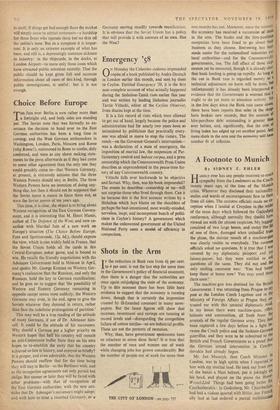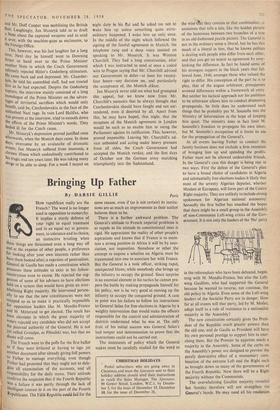A Footnote to Munich
By SIDNEY Z. EHLER HARDLY ever has any people received so mod' sympathy from the Londoners as the Czechs twenty years ago, at the time of the Munich crisis. Wherever they disclosed their nationalitY, smiles and words of encouragement flew to thetn from all sides. The customs officials made no ea' ception when I landed at Croydon in ;the midst of the tense days which followed the Godes berl; conference, although normally they should have viewed me with the utmost suspicion. My luggag consisted of two large boxes, and, under the lid of one of them, damaged when unloaded from the plane, the sinister mouth of a machine-P° was clearly visible to everybody. The customs officials asked no questions. It is true that I Was covered by my diplomatic passport and laissez-passer, but they were entitled to ask questions all the same. They did not and the only smiling comment was: 'You had better keep those at home now ! You may need then' there soon ' The machine-gun was destined for the British Government. I was returning from Prague to mY post at the London Czech Legation and in the Ministry of Foreign Affairs at Prague they et? trusted me with this unusual diplomatic mail' In my boxes there were machine-guns, rifles, helmets and ammunition, all fresh from the arsenals of the regular German army. They had been captured a few days before in. a fight he' tween the Czech police and the Sudeten-German guerrillas, and they were to be submitted to the British and French Governments as a proof tiol the German armed intervention in Czech° slovakia had already begun. Mr. Jan Masaryk, then Czech Minister in London, was in high spirits when I reported to him with my martial load. He took out from one of the boxes a Nazi helmet, put it jokingly on his head, and played on the piano ,the Horst' Wessel-Lied. Things had been going better for Czechoslovakia : in Godesberg, Mr. Chamberlain had had a violent quarrel with Hitler, our Fri rtell ally had at last ordered a partial mobilisation and Mr. Duff Cooper was mobilising the British fleet. Laughingly, Jan Masaryk told us to draft a Note about the captured weapons and to send it Over, with the machine-guns as enclosures, to the Foreign Office.
This, however, was his last laughter for a long time. Next day he himself went to Downing Street to hand over to the Prime Minister another Note in which the Czech Government solemnly rejected Hitler's Godesberg ultimatum. lie came back sad and depressed. Mr. Chamber- lain, he told his assembled staff, had not treated him as he had. expected. Despite the Godesberg rupture, the interview mainly consisted of a long monologue of the Prime Minister on the advan- tages of territorial sacrifices which would only benefit, said he, Czechoslovakia in the face of the unleashed Nazi rage. In vain Lord Halifax, who was present at the interview, tried to smooth down the effects of the Prime Minister's words. They boded ill for the Czech cause.
Mr. Masaryk's depression proved justified soon afterwards, when the Munich days came. In those days, overcome by an avalanche of dramatic events, Jan Masaryk suffered from insomnia, a chronic illness which undoubtedly contributed to his tragic end ten years later. He was taking many drugs to be able to sleep. For a week I stayed on night duty in his flat and he asked me not to wake him up unless something quite extra- ordinary happened. I woke him up only once. In the middle of the night which followed the signing of the fateful agreement in Munich, the telephone rang and a deep voice insisted on speaking to Mr. Masaryk. It was Winston Churchill. They had a long conversation, after which I was instructed to send at once a coded wire to Prague saying that Mr. Churchill advised our Government to defer—at least for twenty- four hours—any decision on, and particularly the acceptance of, the Munich diktat. Jan Masaryk never told me what had erompted this appeal, but we know now from Mr. Churchill's memoirs that he always thought that Czechoslovakia should have fought and not sur- rendered, even if deserted by all. Apart from this, he may have hoped, that night, that the reception of the Munich agreement in London would be such as to enable him to swing the Parliament against its ratification. This, however, proved impossible. Leaving Mr. Churchill's ad- vice unheeded and acting under heavy pressure from all sides, the Czech Government had accepted the Munich verdict, and the first days of October saw the German army marching triumphantly into the Sudetenland.































































 Previous page
Previous page